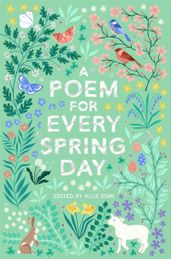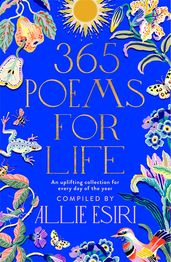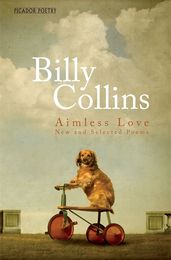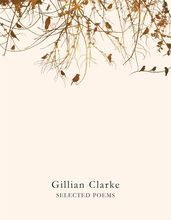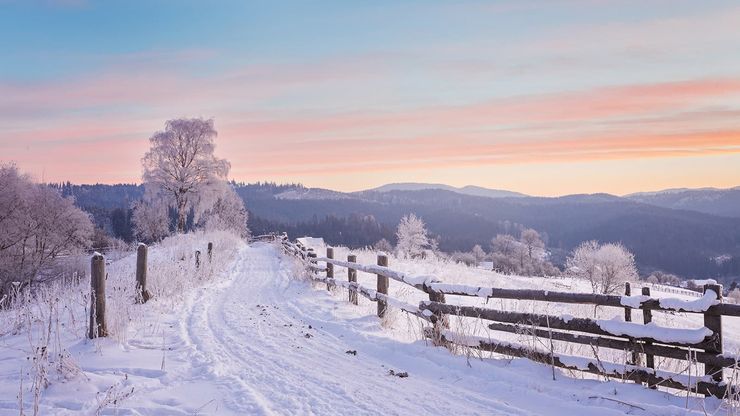Ten beautiful spring poems
Celebrate the season of new beginnings with these beautiful spring poems.
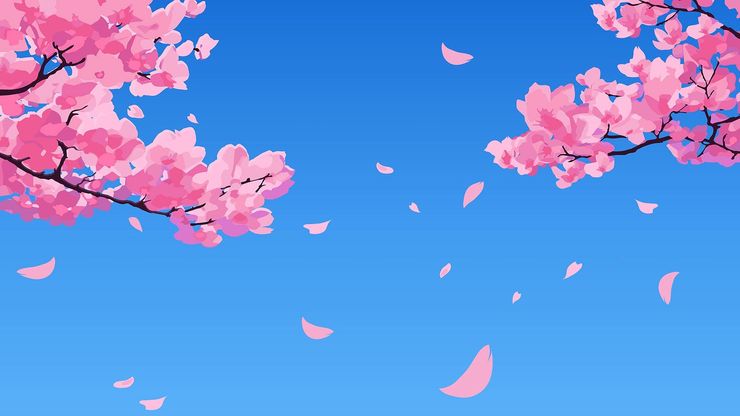
Spring officially begins on 20 March, and with buds on the trees and lighter evenings comes a new spirit of optimism. From Shakespeare to Wordsworth, poets have always been inspired by the season of new beginnings. We’ve curated some of our favourite poems about spring.
Discover our edit of the best poetry books.
Spring
By Christina Rossetti
Frost-locked all the winter,
Seeds, and roots, and stones of fruits,
What shall make their sap ascend
That they may put forth shoots?
Tips of tender green,
Leaf, or blade, or sheath;
Telling of the hidden life
That breaks forth underneath,
Life nursed in its grave by Death.
Blows the thaw-wind pleasantly,
Drips the soaking rain,
By fits looks down the waking sun:
Young grass springs on the plain;
Young leaves clothe early hedgerow trees;
Seeds, and roots, and stones of fruits,
Swollen with sap put forth their shoots;
Curled-headed ferns sprout in the lane;
Birds sing and pair again.
There is no time like Spring,
When life’s alive in everything,
Before new nestlings sing,
Before cleft swallows speed their journey back
Along the trackless track –
God guides their wing,
He spreads their table that they nothing lack, –
Before the daisy grows a common flower
Before the sun has power
To scorch the world up in his noontide hour.
There is no time like Spring,
Like Spring that passes by;
There is no life like Spring-life born to die,
Piercing the sod,
Clothing the uncouth clod,
Hatched in the nest,
Fledged on the windy bough,
Strong on the wing:
There is no time like Spring that passes by,
Now newly born, and now
Hastening to die.
From A Poem for Every Spring Day, edited by Allie Esiri
A Poem for Every Spring Day
by Allie Esiri
This gorgeous collection is full of seasonal poems with a link to the date on which they appear, selected from Allie Esiri’s bestselling poetry anthologies A Poem for Every Day of the Year and A Poem for Every Night of the Year. Including poems by William Wordsworth, Christina Rossetti, John Donne, Emily Dickinson and many more, these verses will transport you to vivid spring-time scenes, taking you from the first sighting of blossoms to Easter.
365 Poems for Life
by Allie Esiri
This uplifting poem-a-day collection is collated by the award-winning curator Allie Esiri and features poets both current (Ocean Vuong) and classic (Dylan Thomas). Find wisdom and wellbeing, and enjoy a quiet moment of calm every day of the year. The perfect gift for poetry lovers and newbies alike.
Spring
By Gerard Manley Hopkins
Nothing is so beautiful as Spring –
When weeds, in wheels, shoot long and lovely and lush;
Thrush’s eggs look little low heavens, and thrush
Through the echoing timber does so rinse and wring
The ear, it strikes like lightnings to hear him sing;
The glassy peartree leaves and blooms, they brush
The descending blue; that blue is all in a rush
With richness; the racing lambs too have fair their fling.
What is all this juice and all this joy?
A strain of the earth’s sweet being in the beginning
In Eden garden. – Have, get, before it cloy,
Before it cloud, Christ, lord, and sour with sinning,
Innocent mind and Mayday in girl and boy,
Most, O maid’s child, thy choice and worthy the winning.
Today
By Billy Collins
If ever there were a spring day so perfect,
so uplifted by a warm intermittent breeze
that it made you want to throw
open all the windows in the house
and unlatch the door to the canary's cage,
indeed, rip the little door from its jamb,
a day when the cool brick paths
and the garden bursting with peonies
seemed so etched in sunlight
that you felt like taking
a hammer to the glass paperweight
on the living room end table,
releasing the inhabitants
from their snow-covered cottage
so they could walk out,
holding hands and squinting
into this larger dome of blue and white,
well, today is just that kind of day.
From Aimless Love: New and Selected Poems by Billy Collins
Aimless Love
by Billy Collins
Aimless Love brings together more than fifty new poems with a selection from Billy Collin's first four books. In turn playful, ironic and serious, Collins's poetry uncovers the wonder in the everyday, addressing themes of love loss, joy and poetry itself.
Lines Written in Early Spring
By William Wordsworth
I heard a thousand blended notes,
While in a grove I sate reclined,
In that sweet mood when pleasant thoughts
Bring sad thoughts to the mind.
To her fair works did Nature link
The human soul that through me ran;
And much it grieved my heart to think
What man has made of man.
Through primrose tufts, in that green bower,
The periwinkle trailed its wreaths;
And ’tis my faith that every flower
Enjoys the air it breathes.
The birds around me hopped and played,
Their thoughts I cannot measure:—
But the least motion which they made
It seemed a thrill of pleasure.
The budding twigs spread out their fan,
To catch the breezy air;
And I must think, do all I can,
That there was pleasure there.
If this belief from heaven be sent,
If such be Nature’s holy plan,
Have I not reason to lament
What man has made of man?
The Thrush
By Edward Thomas
When Winter's ahead,
What can you read in November
That you read in April
When Winter's dead?
I hear the thrush, and I see
Him alone at the end of the lane
Near the bare poplar's tip,
Singing continuously.
Is it more that you know
Than that, even as in April,
So in November,
Winter is gone that must go?
Or is all your lore
Not to call November November,
And April April,
And Winter Winter—no more?
But I know the months all,
And their sweet names, April,
May and June and October,
As you call and call
I must remember
What died into April
And consider what will be born
Of a fair November;
And April I love for what
It was born of, and November
For what it will die in,
What they are and what they are not,
While you love what is kind,
What you can sing in
And love and forget in
All that's ahead and behind.
Sonnet 98
By William Shakespeare
From you have I been absent in the spring,
When proud-pied April, dressed in all his trim,
Hath put a spirit of youth in everything,
That heavy Saturn laughed and leaped with him.
Yet nor the lays of birds, nor the sweet smell
Of different flowers in odour and in hue,
Could make me any summer’s story tell,
Or from their proud lap pluck them where they grew:
Nor did I wonder at the lily’s white,
Nor praise the deep vermilion in the rose;
They were but sweet, but figures of delight
Drawn after you, – you pattern of all those.
Yet seem’d it winter still, and, you away,
As with your shadow I with these did play.
Young Lambs
By John Clare
The spring is coming by a many signs;
The trays are up, the hedges broken down,
That fenced the haystack, and the remnant shines
Like some old antique fragment weathered brown.
And where suns peep, in every sheltered place,
The little early buttercups unfold
A glittering star or two--till many trace
The edges of the blackthorn clumps in gold.
And then a little lamb bolts up behind
The hill and wags his tail to meet the yoe,
And then another, sheltered from the wind,
Lies all his length as dead--and lets me go
Close bye and never stirs but baking lies,
With legs stretched out as though he could not rise.
The Enkindled Spring
By D.H. Lawrence
This spring as it comes bursts up in bonfires green,
Wild puffing of emerald trees, and flame-filled bushes,
Thorn-blossom lifting in wreaths of smoke between
Where the wood fumes up and the watery, flickering rushes.
I am amazed at this spring, this conflagration
Of green fires lit on the soil of the earth, this blaze
Of growing, and sparks that puff in wild gyration,
Faces of people streaming across my gaze.
And I, what fountain of fire am I among
This leaping combustion of spring? My spirit is tossed
About like a shadow buffeted in the throng
Of flames, a shadow that's gone astray, and is lost.
Miracle on St David’s Day
By Gillian Clarke
‘They flash upon that inward eye
Which is the bliss of solitude’
– ‘The Daffodils’ by W. Wordsworth
An afternoon yellow and open-mouthed
with daffodils. The sun treads the path
among cedars and enormous oaks.
It might be a country house, guests strolling,
the rumps of gardeners between nursery shrubs.
I am reading poetry to the insane.
An old woman, interrupting, offers
as many buckets of coal as I need.
A beautiful chestnut-haired boy listens
entirely absorbed. A schizophrenic
on a good day, they tell me later.
In a cage of first March sun a woman
sits not listening, not seeing, not feeling.
In her neat clothes the woman is absent.
A big, mild man is tenderly led
to his chair. He has never spoken.
His labourer’s hands on his knees, he rocks
gently to the rhythms of the poems.
I read to their presences, absences,
to the big, dumb labouring man as he rocks.
He is suddenly standing, silently,
huge and mild, but I feel afraid. Like slow
movement of spring water or the first bird
of the year in the breaking darkness,
the labourer’s voice recites ‘The Daffodils’.
The nurses are frozen, alert; the patients
seem to listen. He is hoarse but word-perfect.
Outside the daffodils are still as wax,
a thousand, ten thousand, their syllables
unspoken, their creams and yellows still.
Forty years ago, in a Valleys school,
the class recited poetry by rote.
Since the dumbness of misery fell
he has remembered there was a music
of speech and that once he had something to say.
When he’s done, before the applause, we observe
the flowers’ silence. A thrush sings
and the daffodils are flame.
From Gillian Clarke's Selected Poems
Selected Poems
by Gillian Clarke
As the National Poet of Wales, Gillian Clarke is one of the best-known poets in the UK. Selected Poems brings together the best of her poetry over the past four decades in a single volume, addressing themes including nature, womanhood, art, music, Welsh history, and perhaps her greatest inspiration: the Welsh landscape and its human stories.
I Watched a Blackbird
By Thomas Hardy
I watched a blackbird on a budding sycamore
One Easter Day, when sap was stirring twigs to the core;
I saw his tongue, and crocus-coloured bill
Parting and closing as he turned his trill;
Then he flew down, seized on a stem of hay,
And upped to where his building scheme was under way,
As if so sure a nest was never shaped on spray.
If these spring poems have inspired you to get back to nature, here are some recommendations for books set in the great outdoors:
Looking for more seasonal poetry? Discover these beautiful autumn poems.
